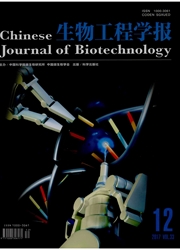

 中文摘要:
中文摘要:
蛋白质磷酸化是最常见的蛋白质翻译后修饰形式。由于蛋白质的磷酸化形式可以被磷酸酶和磷酸激酶进行可逆的调控,所以在众多的生命活动过程中蛋白质的磷酸化修饰起着重要的调控作用,因此对生物体内蛋白质磷酸化修饰的系统研究对于揭示生命科学的奥秘显得十分重要。近年来,随着质谱技术和生物信息学软件以及磷酸化肽段富集方法的发展,利用质谱对生物体内蛋白质磷酸化修饰研究的技术逐渐成熟。肝脏作为人体最重要的代谢和免疫器官,深入研究肝脏细胞内蛋白质磷酸化修饰形式对于理解其功能具有重要指导意义。目前,迅速发展的磷酸化蛋白质组学技术已经被广泛应用到肝脏功能的生物学研究中。这些研究加深了人们对肝脏的生理及病理状态的分子生物学机制的了解。本文综述了当前磷酸化蛋白质组学的研究进展和磷酸化蛋白质组学在肝脏中的研究。
 英文摘要:
英文摘要:
The phosphorylation is one of most common protein post-translational modifications. The protein phosphorylation plays important roles in the life through the reversible process of phosphorylation and dephosphorylation by kinases and phosphatases. Systematical analysis of the phosphorylation state of proteins would greatly help to reveal the mystery of the life. Recently, with the development of mass spectrometer, bioinformatics sortwares and enrichment methods of phosphopeptides, phosphorylation stduy of orgnism proteins by mass spectrometer has become mature gradually. Liver is one of the most important metabolic and immune organs. In-depth study of protein phosphorylation in liver is of great importance to reveal its function. And booming phosphoproteomics has been applied into the study of liver, which has deepened the knowledge of molecular mechnism of its physiology and pathology states. Here, we review the recent progress on the research and development of phosphoproteomics and their application in liver proteomics study.
 同期刊论文项目
同期刊论文项目
 同项目期刊论文
同项目期刊论文
 Development of a rapid high-efficiency scalableprocess for acetylated Sus scrofa cationic trypsin pr
Development of a rapid high-efficiency scalableprocess for acetylated Sus scrofa cationic trypsin pr Quantitative proteomics reveals significant changes incell shape and an energy shift after IPTG indu
Quantitative proteomics reveals significant changes incell shape and an energy shift after IPTG indu Phosphoproteomic Analysis of the MHCC97-H Cell LineReveals the Spliceosome Associated with Metastasi
Phosphoproteomic Analysis of the MHCC97-H Cell LineReveals the Spliceosome Associated with Metastasi Systematic analysis of missing proteins provides an elucidative clue to define all the protein-codin
Systematic analysis of missing proteins provides an elucidative clue to define all the protein-codin Chromosome 8-Coded Proteome of Chinese Chromosome Proteome Data set (CCPD) 2.0 with Partial Immunohi
Chromosome 8-Coded Proteome of Chinese Chromosome Proteome Data set (CCPD) 2.0 with Partial Immunohi Special Enrichment Strategies Greatly Increase the Efficiency of Missing Proteins Identification fro
Special Enrichment Strategies Greatly Increase the Efficiency of Missing Proteins Identification fro Systematic analysis of transcriptome, translatome andproteome provides a global view and potential s
Systematic analysis of transcriptome, translatome andproteome provides a global view and potential s Systematical analysis of missing proteins provides anelucidative clue to define all the protein-codi
Systematical analysis of missing proteins provides anelucidative clue to define all the protein-codi The Tissue-Based Proteogenomics Analysis Reveals thatHuman Testis Endows Plentiful Missing Proteins.
The Tissue-Based Proteogenomics Analysis Reveals thatHuman Testis Endows Plentiful Missing Proteins. Rapid development of proteomics in China: from the perspective of the human liver proteome project a
Rapid development of proteomics in China: from the perspective of the human liver proteome project a First proteomic exploration of protein-encoding genes on chromosome 1 in human liver, stomach, and c
First proteomic exploration of protein-encoding genes on chromosome 1 in human liver, stomach, and c Proteome atlas of human chromosome 8 and its multiple 8p deficiencies in tumorigenesis of the stomac
Proteome atlas of human chromosome 8 and its multiple 8p deficiencies in tumorigenesis of the stomac Qualitative and quantitative expression status of the human chromosome 20 genes in cancer tissues an
Qualitative and quantitative expression status of the human chromosome 20 genes in cancer tissues an Protein profiling of active cysteine cathepsins in living cells using an activity-based probe contai
Protein profiling of active cysteine cathepsins in living cells using an activity-based probe contai Systematic research on the pretreatment of peptides for quantitative proteomics using a C18 microcol
Systematic research on the pretreatment of peptides for quantitative proteomics using a C18 microcol Systematic analysis of missing proteins provides clues to help define all of the protein-coding gene
Systematic analysis of missing proteins provides clues to help define all of the protein-coding gene Quantitative proteomics reveals significant changes in cell shape and an energy shift after IPTG ind
Quantitative proteomics reveals significant changes in cell shape and an energy shift after IPTG ind 期刊信息
期刊信息
